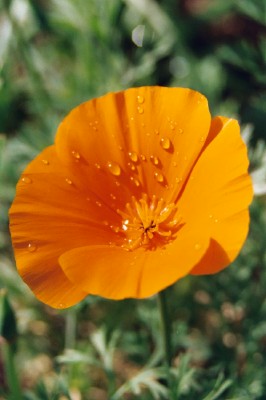 It's rose-pruning season: I've been pruning roses nearly every day for a week or so, from shrubs to climbers to ramblers. My secateurs (Felco no 9's, in case you're an anorak) are fair worn out.
It's rose-pruning season: I've been pruning roses nearly every day for a week or so, from shrubs to climbers to ramblers. My secateurs (Felco no 9's, in case you're an anorak) are fair worn out.In one of the bigger gardens I look after, there's a rather neglected hedge of Rosa Hansa - a rugosa hybrid that's covered in surprisingly soft downy bristles and which, as I discovered to my cost, suckers like crazy. I spent much of my three-hour session there on my hands and knees in the mud (and rain) heaving at inch-thick stems that had burst from the ground up to a metre away. Such are the delights of a gardener's life...!
Rose hedges don't require a lot of work for the pleasure they provide. A quick once-over to tame them in winter (suckers allowing - better to keep on top of these year-round rather than let them get out of control like my Hansa hedge), and that's it for the rest of the year - for which care they reward you with (in the case of Hansa) deep pinkish-crimson flowers with a heavenly scent, followed by fat luscious hips.
The daunting and supremely Victorian rose expert, Gertrude Jekyll, had quite a bit to say about rose hedges in her classic Roses for Gardens (1909). She recommends tipping young shoots to promote bushy growth and prevent the legginess that invariably afflicts roses left to do their own thing:
"If in July [strong young shoots from the base] are shortened about a third, instead of continuing their growth in length, their energy goes to strengthening the shortened piece that is left," she says. "This will then, the following season, be thickly set with flowering laterals that will clothe the lower part of the hedge."
And just as a post-script: in this same chapter she takes the trouble to urge gardeners to learn from doing, not reading about it:
"It is more helpful to show one simple thing that is easily understood, and that awakens interest and enthusiasm... than it is to prompt the learner at every step, fussing like an anxious nurse, and doing for him, what, if his enthusiasm is true and deep and not mere idle froth, will give him more pleasure in the doing, and more profit in the learning, than if it were all done for him," she writes.
"For the very essence of good gardening is the taking of thought and trouble. No-one can do good decorative work who does it merely from a written recipe."
You have been told!







No comments:
Post a Comment